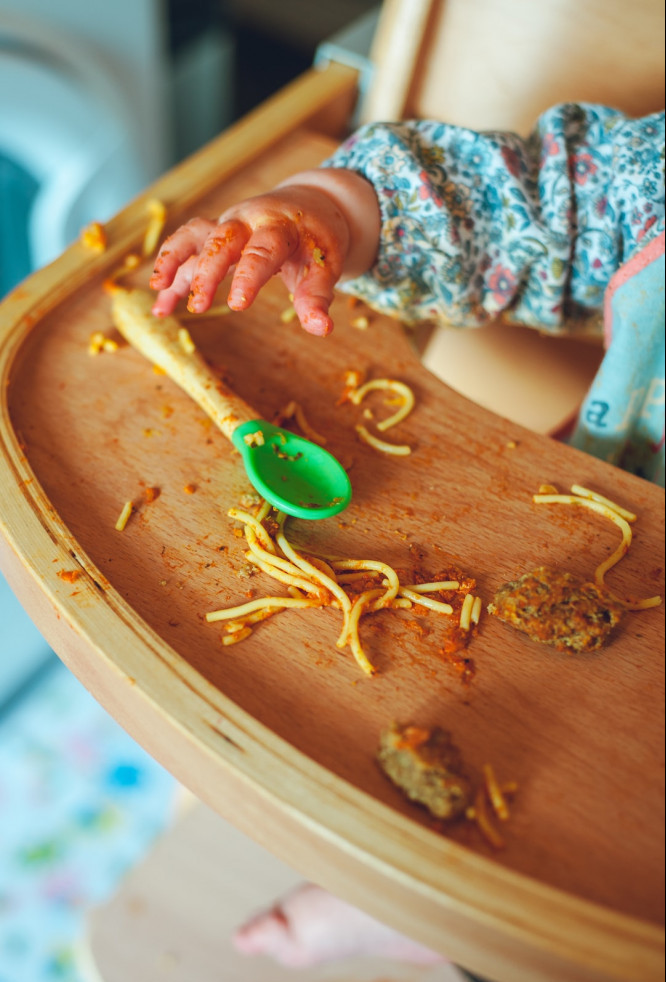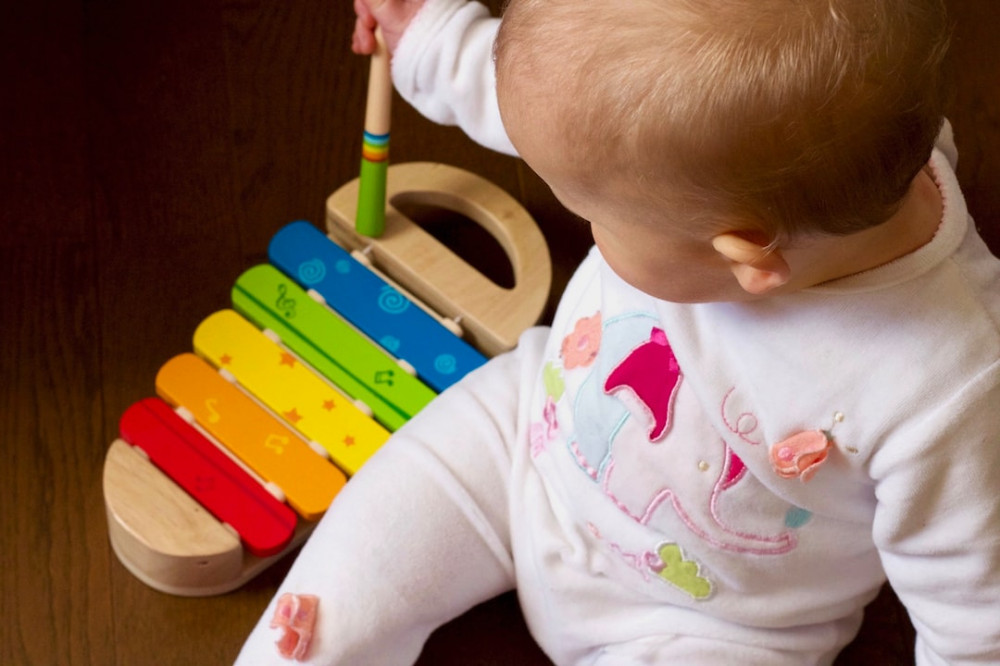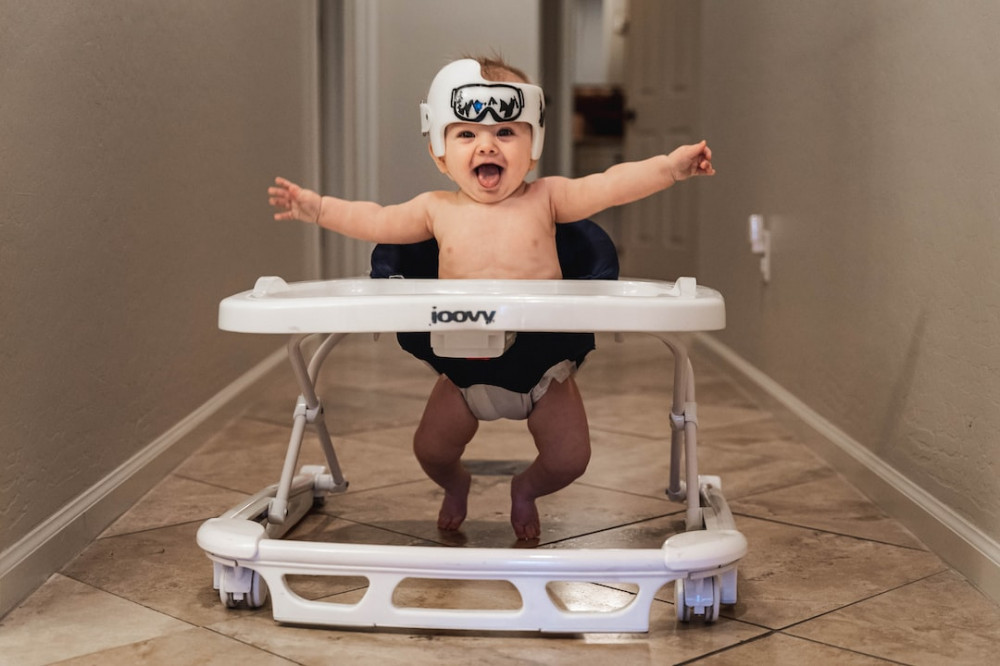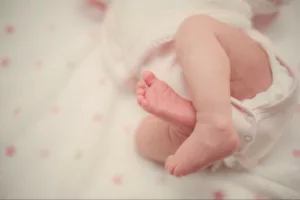
Your baby at 7 months old is able to put anything in his/her mouth, at this age. He/she begins to use
finger and thumb in a pincer, claw-like movement. He/she is more accurate when using fingers to
feed himself. Is able to feed himself/herself crackers. Is ableto rake a raisin and pick it up with his
fist. There is a firm grasp observed at this age, that is less likely to drop a held object.
You would note that your baby at this age is able to explore toys in new and interesting ways, by
pulling different parts of
the toy, by rattling, shaking, and banging them. Uses the hands to explore his/her own and other
faces.Your baby will be rolling competently from tummy to back and back to tummy. More
consistently draws one knee towardshis/her tummy in a crawling movement. Your active cutie may
be crawling, or may be able to move along the floor withhis/her tummy raised. Would often brings
his/her feet to mouth and suck on his toes. Some babies start crawling as early
as 6 or 7 months if they have plenty of supervised tummy time, compared to babies that spends less
time on their bellies.He/she likely will be able to get from tummy to a sitting position and stand
holding on to someone or something. He/shewould take his own weight when supported under his
arms.Your baby’s ability to bring hands together, as the hand-eye coordination and fine motor skills
continue to develop would
surprise you to see his first clap, plays patty cake, wave bye-bye, plays peek-a-boo. Some would even
do things like catcha ball and hold a crayon.
Learning
Your little cutie now understands that he/she can make objects move. He /she is able to work to get a
toy out of reach.He would continue to look for objects that goes out of his vision. Though most
babies under a year are not competentproblem solvers, some child may surprise parents by being
able to figure out a way to get to a toy that’s stuck behind achair. Some babies may be creative in play
using toys in an unusual way, using non-toys creatively as playthings, enjoyingplaying pretend. Some
babies would laugh at daddy tripping over his toys, or mommy spilling his milk. This age starts your
baby’s love for repetition. Your baby would love you to hear about songs a thousand times, be in the
house or the car ride.
He/she would remember faces of familiar adults that she does not see frequently like grandma/
grandpa, baby sitter or yourfriendly neighbor.

Language
At this age, your little cutie would seem to understand your different voice tones when you are
happy, angry, or surprised.Likes to hear songs and babble along with them. He/she would start to
have a clear understanding of a firm ‘no’
A stuffed toy of all shapes and sizes now become a stand-ins for people. These toys can play a big
part in peek-a-boo, actout stories, keep your baby company in all places.
Social and Emotional
Your baby enjoys the familiarity of routine such as bath time and bedtime. Since his attention span is
short, have two orthree playthings within reach, not too many toys at his disposal, as this will
overwhelm and frustrate him. Pots and pans,cuddly stuffed animals or an activity board will surely
be his entertainment. Provide a fresh selection when he seems tobe getting restless. Your baby will
let you know when she’s happy, in pain, or miserable. Gets annoyed if you stop himfrom doing
something.If he continues to complain, try distracting him, getting down to his level for a moment,
without picking him up. Pots and
pans is always a sure way of distraction. Its banging sounds that the baby creates tends to shift the
boredom quickly. Staywithin his view, chatting and singing with him, the gradually stay out of eye
shot but not earshot, and regularly poke yourhead around a corner, playing peek-a-boo, to show him
that when you disappear, you will return.
You can leave him on his playpen, a little longer each time. Postpone picking him up for as long as
you can, but don’t getinto a battle of wills – he’ll almost always win. If you wait until he’s screaming
to pick him up. he will conclude that that is
the way to get attention. He/she is aware of verbal praise and enthusiasm. Be generous to praise,
promoting the positive things.
Like most babies, this is the age that they are learning how to be manipulative. Even at his tender
age, your baby is shrewdenough to see that playing the abandoned and neglected victim is the best
way to guarantee that he will get his extra doseof love and attention when you arrive home. He/she
plays on your insecurities, instill the guilt, and gets what he wants.
The fact that most babies and toddlers, are most likely to act up with their parents than their care
takers, is a sign that theyare more comfortable and secure with their parents. They know that they
can let their emotions show without risking theloss of love. But this acting up is not always random.
It often has a purpose. Not only does it get and keep parentalattention, but also a way of testing
limits. Examples would be smearing carrots in his hair, or keeps dropping toys out of his
playpen, or repeatedly maneuvers his walker to the brink of the stairway.
A certain amount of manipulation is healthy, as it gives the baby a chance to exercise some control
over his environment. Its
when it gets out of hand that it is detrimental to emotional growth. Set limits on things you think is
important for his healthand safety and your sanity.

I want you to feel that you can reach out to me if ever you have questions or want to share ideas that you have related to the care of babies, growing premature babies, and the overall health issues pertaining tothe care of babies OR just drop me a comment to just say “Hello” or “what’s up”.
All The Best,
Maria Teresa
BabiesBuddies.com



